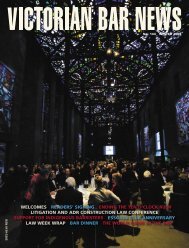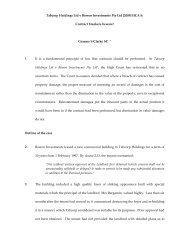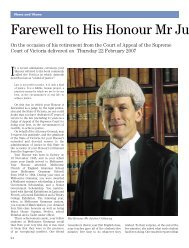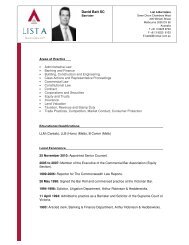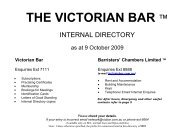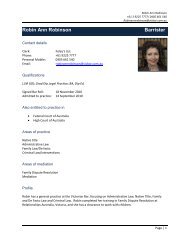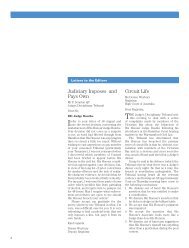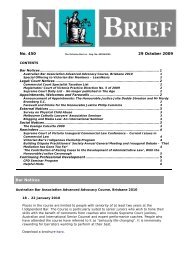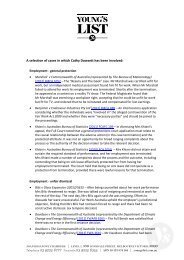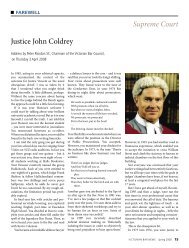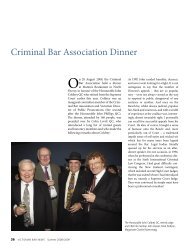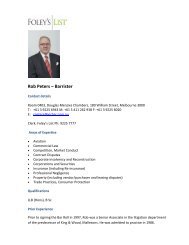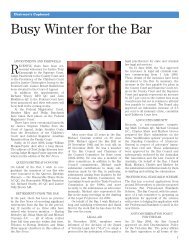Justice William Charles Crockett AO - Victorian Bar
Justice William Charles Crockett AO - Victorian Bar
Justice William Charles Crockett AO - Victorian Bar
- No tags were found...
Create successful ePaper yourself
Turn your PDF publications into a flip-book with our unique Google optimized e-Paper software.
should be set aside on the groundthat it is unreasonable, or cannotbe supported having regard to theevidence. The appellate court mustmake its own independent assessmentof the evidence and determinewhether, making due allowance forthe “natural limitations” that existin the case of an appellate courtproceeding wholly or substantiallyon the record, the accused wasproved beyond reasonable doubt tobe guilty of the offence on which thejury returned its verdict of guilty.There will be cases, perhaps manycases, where those natural limitationsrequire the appellate court toconclude that it cannot reach thenecessary degree of satisfaction. Insuch a case the proviso would notapply…[42] It is neither right nor useful to attemptto lay down absolute rules or singulartests that are to be applied by anappellate court where it examinesthe record for itself, beyond the threefundamental propositions mentionedearlier … It is not useful to attemptthat task because to do so wouldlikely fail to take proper account ofthe very wide diversity of circumstancesin which the proviso falls forconsideration.[43] There are, however, some mattersto which particular attention shouldbe drawn. First, the appellate court’stask must be undertaken on the wholeof the record of the trial including thefact that the jury returned a guilty verdict… But there are cases in whichit would be possible to concludethat the error made at trial would,or at least should, have had no significancein determining the verdictthat was returned by the trial jury.The fact that the jury did return aguilty verdict cannot be discardedfrom the appellate court’s assessmentof the whole record of trial. Secondly,it is necessary always to keep two mattersat the forefront of consideration:the accusatorial character of criminaltrials such as the present and that thestandard of proof is beyond reasonabledoubt.[44] Next, the permissive language of theproviso (“the Court ... may, notwithstandingthat it is of opinion that thepoint raised in the appeal might bedecided in favour of the appellant,dismiss the appeal ...”) is important.So, too, is the way in which the conditionfor the exercise of that poweris expressed (“if it considers thatno substantial miscarriage of justicehas actually occurred”). No singleuniversally applicable descriptionof what constitutes “no substantialmiscarriage of justice” can be given.But one negative proposition maysafely be offered. It cannot be saidthat no substantial miscarriage of justicehas actually occurred unless theappellate court is persuaded that theevidence properly admitted at trialproved, beyond reasonable doubt, theaccused’s guilt of the offence on whichthe jury returned its verdict of guilty.[45] Likewise, no single universallyapplicable criterion can be formulatedwhich identifies cases in whichit would be proper for an appellatecourt not to dismiss the appeal, eventhough persuaded that the evidenceproperly admitted at trial proved,beyond reasonable doubt, theaccused’s guilt. What can be said,however, is that there may be caseswhere it would be proper to allowthe appeal and order a new trial,even though the appellate court waspersuaded to the requisite degree ofthe appellant’s guilt … [Footnotesomitted, additional emphasis added.]Although it is not an easy task to determinecomprehensively all of the implicationsof Weiss, 30 a few propositions maybe distilled:• There may be many cases where thenatural limitations attendant uponappellate review lead an appellatecourt to the view that it cannot reachsatisfaction beyond reasonable doubt.(This seems to be directed towards,for example, those cases which turnon the credit of witnesses judged fromdemeanour.)• There are cases in which it would bepossible to conclude that the errormade at trial would (or at least should)have had no significance in determiningthe verdict returned by the jury.(Presumably, for example, those casesthat do not turn on demeanour.)• No single universally applicabledescription of what constitutes “nosubstantial miscarriage of justice” canbe given.• No single universally applicable criterioncan be formulated which identifiescases in which it would be proper foran appellate court not to dismiss theappeal, even though persuaded thatthe evidence properly admitted at trialproved guilt beyond reasonable doubt.• There may be cases where it would beproper to allow the appeal and order anew trial, “even though the appellatecourt was persuaded to the requisitedegree of the appellant’s guilt”.On a practical level a cynic mightobserve that Weiss now permits anintermediate appellate court to say to anappellant: “You’ve not had a proper trialaccording to law before this jury (whoseconstitutional function is to determineguilt or non-guilt), but we’re going to denyyou a proper trial before another jurybecause we think that you’re guilty. Wewill be your jurors and we will try you.”THE HIGH COURT POST-WEISSImmediately following Weiss, the HighCourt delivered judgment in Nudd v TheQueen (2006) 80 ALJR 614; 225 ALR16. Much of the language was redolentof Mraz. 31 Only the Chief <strong>Justice</strong> 32 andKirby J 33 mentioned Weiss; and then onlyin passing. It excited hope in some quartersthat Weiss was, perhaps, quietly to beswept under the judicial carpet.However, the proviso was again up forgrabs in Darkan (2006) 80 ALJR 1250;228 ALR 334. Somewhat disappointingly,the majority 34 repeated that “[a]n appellatecourt invited to consider whether asubstantial miscarriage of justice has actuallyoccurred is to proceed in the sameway as an appellate court invited to decidewhether a jury verdict should be set asideon the ground that it is unreasonable, orcannot be supported having regard to theevidence”. 35 In so doing it “must makeits own independent assessment of theevidence and determine whether, makingdue allowance for the natural limitationsthat exist in the case of an appellate courtproceeding wholly or substantially on therecord, the accused was proved beyondreasonable doubt to be guilty”.In dissent, Kirby J made some furtherimportant observations as to the applicationof the proviso:[139] … The ordinary postulate of the Australianlegal system is that a person,accused of a crime, is entitled to atrial that conforms to the requirementsof the law. Most especially, inthe trial of serious criminal charges,the person is normally entitledto have the jury, as the “constitutionaljudge of fact”, resolvecontested questions of fact by theapplication of the applicable lawcorrectly explained to them by thepresiding judge …[140] A legal mistake in peripheral mat-37



